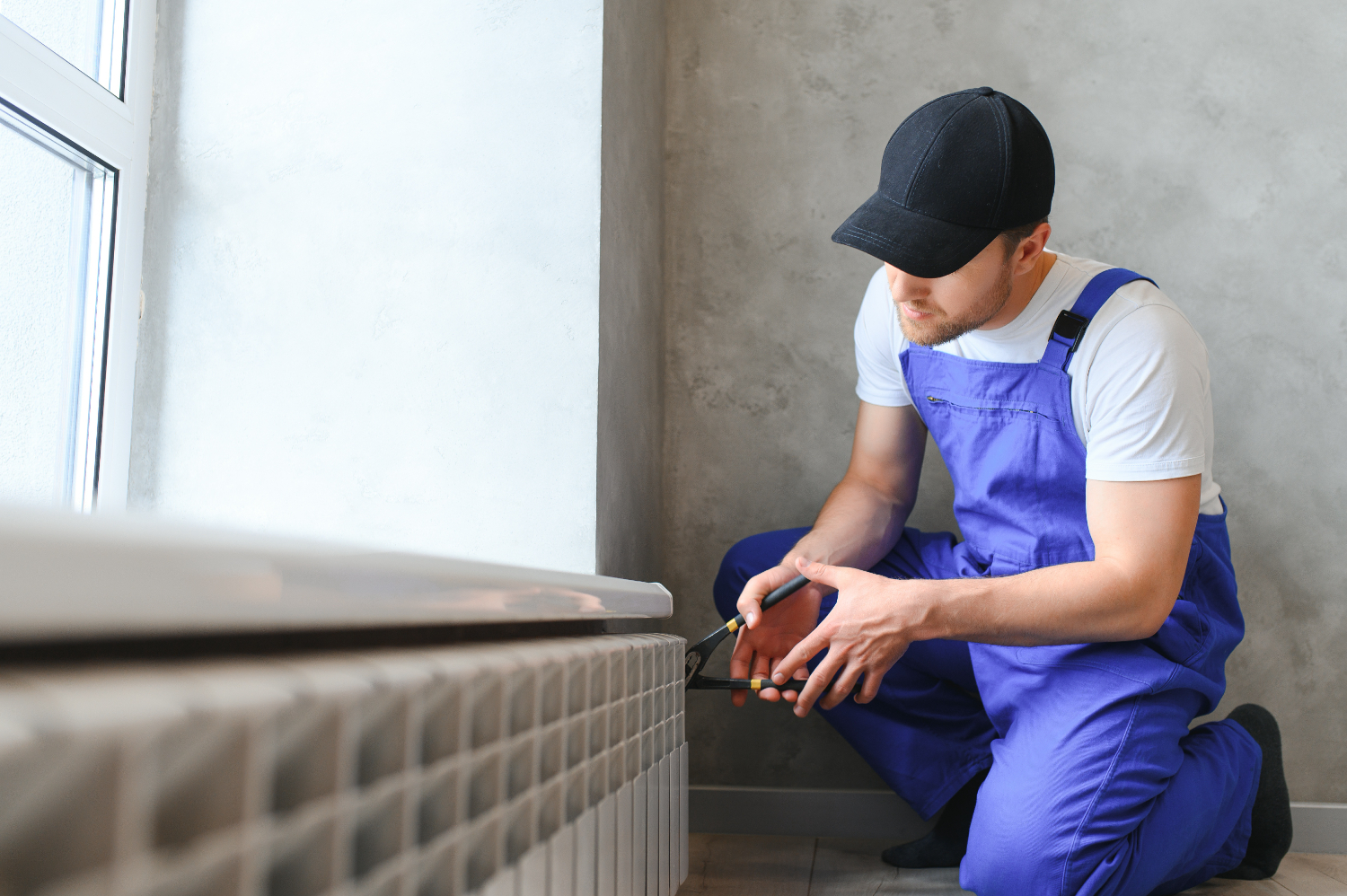Fixing your heating system can be challenging, and it’s often best to call a professional as they have the tools and know-how to solve most heating problems safely and quickly. A heating repair expert can check your system, find the issue, and fix it fast. This keeps your home warm and helps your heater run better and last longer.
However, there are some things you can do yourself to maintain your heating system which we will also include in this guide.
6 Common Heating Problems and Causes
- Dirty or damaged filters are a frequent issue, causing your system to work harder and potentially lead to breakdowns. Change your filters regularly to avoid this problem.
- Strange noises can often mean loose or broken parts. For example, squealing might be a belt problem, while rattling could be a loose panel.
- If your heater won’t turn on, check your thermostat as it might need new batteries or be on the wrong setting.
- Uneven heating in your home can mean blocked vents or leaky ducts so check that all vents are open and clear of furniture.
- A yellow pilot light instead of blue suggests a gas flow problem and needs quick attention from a professional heating technician.
Improving Efficiency and Indoor Air Quality
Proper heating system maintenance can boost efficiency and create a healthier indoor environment. These upgrades can lower energy bills and improve comfort in your home.
Energy-Efficient Heating Solutions
Replace old furnaces with high-efficiency models, looking for ENERGY STAR-certified units that could save up to 15% on heating costs. For extra savings, install a programmable thermostat to adjust temperatures based on your schedule, cutting energy use by a further 10-15%.
Seal air leaks around windows and doors with weather-stripping and add insulation to your attic, walls, and floors. This keeps warm air inside and reduces how hard your system needs to work.
Have a professional tune-up of your heating system yearly. They’ll clean components and check for issues that impact efficiency. You could upgrade to a heat pump system for both heating and cooling which are extremely energy efficient, and modern heat pumps also work well in cold climates.
Enhancing Indoor Air Quality
Change air filters regularly as they are essential to trap dust, pollen, and other particles. Use high-quality pleated filters rated MERV 8 or higher for the best air cleaning.
Add a whole-home air purifier to remove more pollutants as these systems work with your HVAC to clean air as it circulates. Also, install exhaust fans in bathrooms and kitchens to remove excess moisture and odors.
Keep indoor humidity between 30-50% with a humidifier or dehumidifier to prevent mold growth and keep air fresh. You should arrange to have your air ducts cleaned if you see dust or mold inside vents, removing built-up debris that can spread through your home.
Open windows when the weather permits to let in fresh air and only use low-VOC paints and cleaning products to reduce harmful fumes in your home.
Maintenance and Prevention: Checklist
Regular care keeps heating systems running smoothly. It helps catch issues early and saves money on repairs and energy bills.
Routine Heating System Maintenance
- Clean or replace air filters every 1-3 months.
- Schedule yearly checkups with a professional technician. They’ll clean and inspect key parts like the burner, heat exchanger, and blower.
- Check your thermostat settings to ensure it’s set correctly for the season.
- Clean vents and registers to remove dust and debris to improve airflow.
- Keep the area around your furnace clear of furniture and large items.
Preventing Common Heating Issues
- Test your carbon monoxide detectors regularly and replace batteries as needed.
- Listen for odd noises from your system.
- Watch for short cycling. If your system turns on and off too often, it may need repair.
- Check for uneven heating in your home as cold spots might mean duct issues.
- Seal air leaks around windows and doors. This helps your system work less.
- Set your thermostat a bit lower in winter as each degree can cut your energy bill by 1-3%.
Hiring HVAC Contractors
Finding the right HVAC contractor is key to getting quality heating repairs and you’ll want to check their qualifications and experience. Good HVAC services start with a thorough inspection that involves checking your whole system, not just the broken part.
Qualifications and Certifications
HVAC contractors need proper training and licenses and you should only look for technicians with NATE (North American Technician Excellence) certification. This shows they’ve passed rigorous tests on HVAC systems.
State licenses are also important so check if your contractor is licensed in your area. Many states require HVAC professionals to renew their licenses regularly. Ask about their insurance too because they should have liability insurance and workers’ compensation to protect you if accidents happen during repairs.
What to Look for in HVAC Services
Experience matters and you should discuss how long the company has been in business and ask them to provide references from previous customers. Read online reviews too as this can give you an idea of their work quality and customer service.
Ask for a written estimate before any work begins that should list all costs for parts and labor. Be wary of prices that seem too low. Quality work often costs more and brings long-term benefits. Look for companies that offer warranties on their work as this shows they have confidence in their repair work.
Finally, check if they’re available for emergencies because heating issues can happen at any time. Speak to us today to discuss an inspection of your heating system or to arrange repairs.










